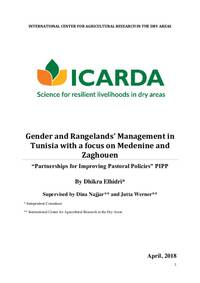Gender and Rangelands’ Management in Tunisia with a focus on Medenine and Zaghouen “Partnerships for Improving Pastoral Policies” PIPP

Authors:
The purpose of this study is to explore gender roles, relations, constraints and opportunities in livestock production with a focus on rangelands. Overall, there is very little research conducted on gender issues (such as roles, relations, and responsibilities) in rangelands in Tunisia. This study is therefore an important step towards filling this research gap and particularly bridging gender issues across roles, decision-making power, participation in public life and entrepreneurship, access to resources, innovation adoption, and adaptation to climate change.
Combining analysis of roles, decision-making power, adoption of innovation, adaptation to climate change, and access to resources with gender perspective helps draw a fuller picture of obstacles and gender gaps to rangelands use and management in rural areas and the ways women overcome them. The past decade has brought significant changes in rural areas of Tunisia which remain understudied, especially from a gender lens. These considerations are important for Tunisia as women increasingly participate in agriculture due to male out-migration.
